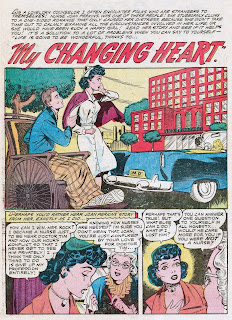"My Changing Heart" is the cover story for Ajax Farrell's My Personal problem 3 (Sept. 1956). It's a cool cover, nicely drawn, which largely gives away the plot to this short 6 page nurse romance story. Nurse Joan Perkins is hopelessly in love with Doctor Tim, a narcissist so full of himself it's nauseating. He doesn't return her affections, and basically couldn't care less about her. Joan's patient, Johnny Caine, however, is very interested in her. He's good looking too, but Joan is so besotted with the worthless Tim that she doesn't realize what's beginning to happen between herself and Johnny. Tim's running around with some other woman so Joan, with her time off because it doesn't coincide with Tim's, devotes her hours to giving Johnny company. Johnny's not complaining, but his communications of affection for Joan are still falling on deaf ears. When Tim comes by and sees Joan volunteering her time to attend Johnny, he assumes she's gold-digging and that Johnny is her rich patient and potential husband. What an absolute cad that Tim is! Perpetuating such a harmful negative stereotype of nurses!
Tim is just so arrogant, and his indifference to Joan is insulting. However, maybe the problem is also with Joan. After all, has Tim been leading her on? NO! Has he even given any indication that he's interested in Joan romantically? Quite the contrary - he's made it abundantly clear that he doesn't see them in a relationship. He may be a bit of an @$$ but at least he's honest. Maybe Joan's denial of the reality of what actually or potentially exists between her and Tim is the biggest issue here. She's also in denial about Johnny's declarations of love for her, and of her own growing feelings for him. Finally she's snapped out of it when she hears the news of Tim's elopement. Fortunately for her, Johnny's the kind of bloke who's ready to wait for the girl of his dreams to come to her senses, and all ends well.
Thus ends Joan's illusion and the unrequited love she was torturing herself with. It's not like Johnny's second best either. Joan lucked out in the end.
I noticed that this comic, along with many romance books that have nurse romance stories, has a nursing recruitment ad. I've seen them in other books that aren't carrying a nurse romance story, but I wondered if there was a connection, a kind of arrangement between the comic book company and the particular nursing entity, in this case the Post Graduate Hospital School of Nursing in Chicago, to add a nurse romance into the book, that somehow portrayed nursing as a desirable profession for young women. Although the nurse in this one is a bit slow on the uptake, her anguish-laden search for love is something many girls could relate to back then. It was precisely because she was a dedicated nurse that she ended up with dreamboat Johnny Caine. So the messages this story puts out in terms of the image of nurses are:
1. nurses are the doctor's handmaidens - typical stereotype from this period. Joan is there to tend to Tim's needs, like when he has a headache. But she means nothing to him.
2. nurses are self-sacrificing angels - Joan donates her free time to looking after Johnny.
3. nursing provides significant opportunities for women to find high grade marriage partners. Surely young women wouldn't become nurses in order to snag a man! But Joan ended up with a good one she most likely wouldn't have met had she not been a nurse. So in this story, the nurse gets a handsome (and potentially rich) patient for a husband instead of the alternative, a handsome (and potentially rich) doctor. Either way is fine, right!?









I have always loved the name of this title. It just cracks me up! The ad is great too -- some of the points remind me of today - not enough nurses, the excellent pay, the independence. From what I can tell from my nurse friends, it tends to be true! Well, except the 21 jewel watch part!
ReplyDeleteJacque: I know what you mean about that series title - it has a slightly different connotation today than was intended back in the early 50s.
ReplyDelete